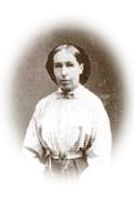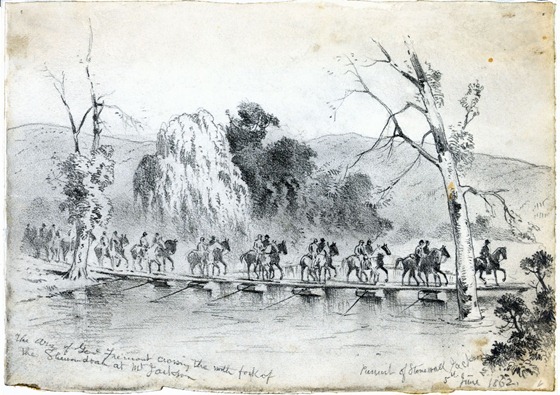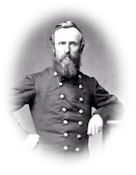 “Wilson Small,” June 5.
“Wilson Small,” June 5.
Dear Mother, — I finished my last letter (to A., I believe) on the afternoon of the day when we took eighty men on the “Small,” and transferred them to the “Webster.”
“We had just washed and dressed, and were writing letters, when Captain Sawtelle came on board to say that several hundred wounded men were lying at the landing; that the “Daniel Webster No. 2” had been taken possession of by the medical officers, and was already half full of men, and that the surplus was being carried across her to the “Vanderbilt;” that the confusion was terrible; that there were no stores on board the “Daniel Webster No. 2” (she having been seized the moment she reached the landing on her return from Yorktown, without communicating with the Commission), nor were there any stores or preparations, not even mattresses, on board the “Vanderbilt.”
Of course the best in our power had to be done. Mrs. Howland and I begged Mr. Olmsted not to refrain from sending us, merely because we had been up all night. He said he would n’t send us, but if we chose to offer our services to .the United States surgeon, he thought it would be merciful. Our offer was seized. We went on board; and such a scene as we entered and lived in for two days I trust never to see again. Men in every condition of horror, shattered and shrieking, were being brought in on stretchers borne by “contrabands,” who dumped them anywhere, banged the stretchers against pillars and posts, and walked over the men without compassion. There was no one to direct what ward or what bed they were to go into. Men shattered in the thigh, and even cases of amputation, were shovelled into top berths without thought or mercy. The men had mostly been without food for three days, but there was nothing on board either boat for them; and if there had been, the cooks were only engaged to cook for the ship, and not for the hospital.
We began to do what we could. The first thing wanted by wounded men is something to drink (with the sick, stimulants are the first thing). Fortunately we had plenty of lemons, ice, and sherry on board the “Small,” and these were available at once. Dr. Ware discovered a barrel of molasses, which, with vinegar, ice, and water, made a most refreshing drink. After that we gave them crackers and milk, or tea and bread. It was hopeless to try to get them into bed; indeed, there were no mattresses on the “Vanderbilt.” All we could do at first was to try to calm the confusion, to stop some agony, to revive the fainting lives, to snatch, if possible, from immediate death with food and stimulants. Imagine a great river or Sound steamer filled on every deck,—every berth and every square inch of room covered with wounded men; even the stairs and gangways and guards filled with those who are less badly wounded; and then imagine fifty well men, on every kind of errand, rushing to and fro over them, every touch bringing agony to the poor fellows, while stretcher after stretcher came along, hoping to find an empty place; and then imagine what it was to keep calm ourselves, and make sure that every man on both those boats was properly refreshed and fed. We got through about 1 A. M., Mrs. Howland and Georgy having come off other duty and reinforced us.
We were sitting for a few moments, resting and talking it over, and bitterly asking why a Government so lavish and perfect in its other arrangements should leave its wounded almost literally to take care of themselves, when a message came that one hundred and fifty men were just arriving by the cars. It was raining in torrents, and both boats were full. We went on shore again: the same scene repeated. The wretched “Vanderbilt” was slipped out, the “Kennebec” brought up, and the hundred and fifty men carried across the “Daniel Webster No. 2” to her, with the exception of some fearfully wounded ones, who could not be touched in the darkness and rain, and were therefore made as comfortable as they could be in the cars. We gave refreshment and food to all; Miss Whetten and a detail of young men from the “Spaulding” coming up in time to assist, and the officers of the “Sebago,” who had seen how hard pressed we were in the afternoon, volunteering for the night-watch. Add to this sundry Members of Congress, who, if they talked much, at least worked well. One of them, the Hon. Moses F. Odell, proposed to Mr. Olmsted that on his return to Washington he should move that the thanks of Congress be returned to us! Mr. Olmsted, mindful of our feelings, promptly declined.
We went to bed at daylight with breakfast on our minds, and at six o’clock we were all on board the “Daniel Webster No. 2,” and the breakfast of six hundred men was got through with in good time. Captain Sawtelle kindly sent us a large wall-tent, twelve caldrons and camp-kettles, two cooks, and a detail of six men. The tent was put up at once; Dr. Ware giving to its preparation the only hour when he might have rested during that long nightmare. We began to use it that (Tuesday) morning. It is filled with our stores; there we have cooked not only the sick-food, but all the food needed on the Government boats. It was hard to get it in sufficient quantity; but when everything else gave out, we broke up “hard-tack” into buckets full of hot milk and water a little sweetened, — “bread and milk” the men called it. Oh, that precious condensed milk, more precious to us at that moment than beef essence!
Tuesday was very much a repetition of Monday night. The men were cleared from the main-deck and gangways of the “Daniel Webster No. 2” on to the “Kennebec.” The feeding business was almost as hard to manage as before. But still it was done, and we got to bed at 1 A. M. Mrs. M. and I were to attend to the breakfast at six next morning. By some accident Mrs. Howland, who was ready quite as soon as I was, was carried off by the “Small,” which started suddenly to run down to the “Spaulding.” I had, therefore, to get the breakfast alone. I accomplished it, and then went ashore and fed some men who were just arriving in the cars, and others who were in tents near the landing. The horrors of that morning are too great to speak of. The men in the cars were brought on board the “Daniel Webster No. 2” and laid about the vacant main-deck and guards and on the deck of a scow that lay alongside. I must not, I ought not to tell you of the horrors of that morning. One of the least was that I saw a “contraband ” step on the amputated stump of a wretched man. I took him by the arm and walked him into the tent, where I ordered them to give him other work, and forbade that he should come upon the ships again. I felt white with anger, and dared not trust myself to speak to him. While those awful sights pass before me I have comparatively no feeling, except the anxiety to alleviate as much as possible. I do not suffer under the sights; but oh! the sounds, the screams of men. It is when I think of it afterwards that it is so dreadful.
All yesterday (Wednesday), after the early morning, things went better. Our tent-kitchen worked to a charm. Dinner was well through by 2 P. M., and we had time to look after the men individually, and to make preparations for two hundred more, who were expected by the railway at 4 P. M. They did not come, however, till 1 A. M. While my letter has been in progress (with countless interruptions) Mrs. Griffin and Mr. Woolsey have come in to report that the two Government boats, the “Louisiana” and “State of Maine ” (which have taken the place at the landing of the “Vanderbilt” and the “Daniel Webster No. 2”), are in good order, have excellent hospital stewards; that the Commission has supplied them with ample stores; and that the two hundred men who came down this morning have gone quietly on board the “State of Maine” and are comfortable. I hope, I pray, the worst is over.
About nine hundred wounded remain to be brought down. Mr. Olmsted says our boats have transported one thousand seven hundred and fifty-six since Sunday; the Government and Pennsylvanian boats together about three thousand. Mr. Clement Barclay was with us on Monday night on the “Vanderbilt.” I believe he went with her to Fortress Monroe. He was working hard, with the deepest interest and skill. I went with him to attend to a little “Secesh” boy, wounded in the thigh; also to a Southern colonel, a splendid-looking man, who died, saying to Mr. Barclay, with raised hand: “Write to my wife and tell her I die penitent for the part I have taken in this war.” I try to be just and kind to the Southern men. One of our men stopped me, saying: “He’s a rebel; give that to me.” I said, “But a wounded man is our brother!” (rather an obvious sentiment, if there is anything in Christianity); and they both touched their caps. The Southerners are constantly expressing surprise at one thing or another, and they are shy, but not surly, at receiving kindness. Our men are a noble set of fellows, so cheerful, uncomplaining, and generous.
Remember that in all that I have written, I have told you only about ourselves, — the women. What the gentlemen have been, those of our party, those of the “Spaulding” and of the other vessels, is beyond my power to relate. Some of them fainted from time to time.
Several regiments have come up yesterday and to-day as reinforcements. Their bands are gay, and the trim look of the men almost amusing. The Southerners wear no uniforms, and are the shabbiest set of fellows. Short gray spencers, and trousers of any color or no color, are the nearest approach to regimentals that I have seen.
Last night, shining over blood and agony, I saw a lunar rainbow; and in the afternoon a peculiarly beautiful effect of rainbow and stormy sunset, — it flashed upon my eyes as I passed an operating-table, and raised them to avoid seeing anything as I passed.











